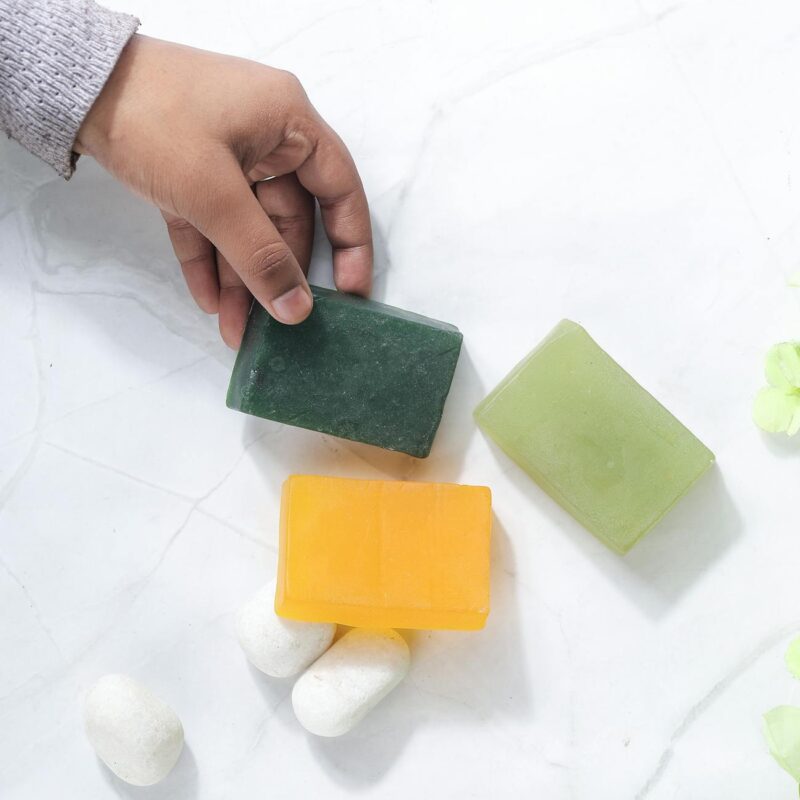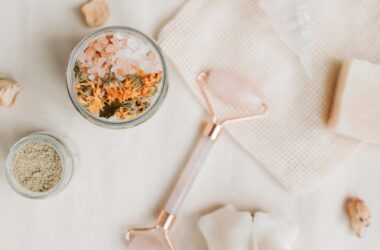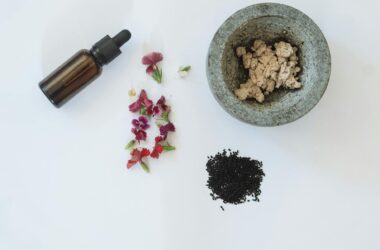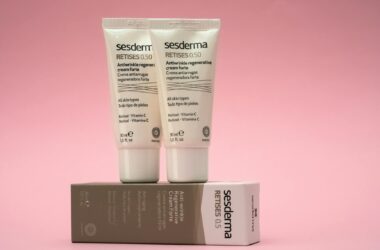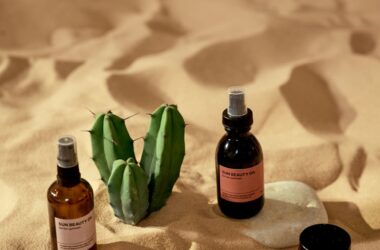Glycerin has antibacterial and anti-inflammatory qualities. Glycerin is touted as a moisturizer with unmatched hydrating qualities which makes it ideal for sensitive skin.
But is this really the case?
Is Glycerin Safe For Sensitive Skin?
If you have sensitive skin, glycerin may be an excellent choice for your moisturizer or cleanser because it has soothing properties.
In fact, it’s one of the gentlest ingredients used in cosmetics products today.
The American Academy of Dermatology recommends glycerin for people with dry or sensitive skin because it won’t irritate the epidermis.
How To Use Glycerin Safely For Sensitive Skin
Glycerin is one of the few ingredients that can safely be used on sensitive skin without causing irritation or inflammation.
But as with every skincare product, you should still use it with care.
Here are some tips to help you get the best possible results from using glycerin on your face.
1. Always use fresh, unopened bottles of glycerin.
2. Do not use old bottles of glycerin because there is always a chance that the glycerin might have gone bad.
3. Make sure to check the manufacturing date on the bottle before using the product.
4. Do not substitute glycerin with other home remedies like honey or aloe vera gel without your doctor’s approval.
5. If you are allergic to any of the ingredients in glycerin, do not use it without consulting your dermatologist.
6. Do a patch test before using glycerin to check for any allergies or adverse reactions to it on your skin.
7. Wash your face thoroughly and apply moisturizer before using a facial mask with glycerin so that you do not get a dry feeling after washing off the mask from your face later on.
8. Mix some baking soda in water and apply this mixture on your skin if you experience dryness or irritation after using a glycerin-based product for too long or for too many times in one go.
9. Do not use products that contain only glycerin as an ingredient without consulting your dermatologist first as they can cause acne breakouts and blackheads.
What Is The Least Expensive Way To Use Glycerin On Sensitive Skin?
The most economical way to use glycerin for sensitive skin is to maximize its benefits and minimize the use of other products.
Glycerin is a humectant, which means it attracts moisture. When used in conjunction with a water-based product, such as an oil-free moisturizer or an oil-free cleanser, glycerin will draw water from the air into your skin and hold it there.
Glycerin can also be used with a larger amount of water-based products to achieve the same effects.
If you already have a water-based moisturizer, you can simply add glycerin to it and apply it daily.
Does Glycerin Work On All Skin Types
Yes, it works on all skin types. However, do a patch test before using glycerin on your skin.
Glycerin is not only good for dry skin but also for oily skin. For dry skin, mix glycerin with rose water and apply it to your face and neck overnight.
For oily skin, mix it with lemon juice and apply it on your face and neck overnight.
Does Glycerin Clog Pores?
Glycerin is a humectant that occurs naturally in our skin. It’s an ingredient we use in many of our products and one that has both benefits and drawbacks.
The good news is that glycerin won’t clog pores. In fact, it’s one of the most effective moisturizing ingredients out there.
The bad news is that it can cause irritation, depending on its formulation and how your skin reacts to it.
Does Glycerin Make Your Face Break Out?
Yes, it can. A lot of people have allergic reactions to glycerin and develop a rash or acne-like bumps.
If you’re having a reaction to glycerin that you put on your face, stop using it immediately. Glycerin is also known as glycerol or glycerine and is found in many skincare products.
It’s safe for most people, but if your skin is sensitive to it, you could end up with breakouts or a worse problem.
Allergy test
If you want to test yourself for an allergy to glycerin, try the glycerin patch test first.
Put some pure glycerin on a piece of tape and press it against your arm for 24 hours.
Remove the tape and check the area after 24 hours. If there’s redness or irritation, you’re probably allergic to glycerin.
If there isn’t any irritation, you can use small amounts of glycerin in skincare products for a few days to see if you react to it.
Reaction symptoms
If you have an allergy to glycerin, your skin may become red, bumpy, and itchy when applied.
Can You Use Glycerin In The Daytime?
Glycerin is a natural ingredient that’s been used in skin care for centuries — and it’s safe to use during the day. It doesn’t have any sun protection properties, so you’ll still need to wear sunscreen (as everyone should do every day!).
But glycerin itself won’t make your skin more sensitive to sunlight.
When you apply it in the morning, look for products with glycerin as one of the first five ingredients listed on the packaging.
That indicates a high concentration of glycerin in the formula. For instance, our Oil-Free Gel Moisturizer contains glycerin as the third ingredient.
Will Glycerin Make My Skin Oily?
A lot of people avoid glycerin because they think it will make their skin oily, but glycerin is actually a wonderful ingredient for all skin types.
As we said, you need both oil and water to survive. Glycerin is an emollient, which means it smooths the skin and makes it more supple.
It also draws moisture from the environment, so if your skin is dry, products with glycerin can help the moisture sink in deeper.
If your skin is oily, applying a hydrating product with glycerin may help balance out your skin’s natural oils.
Benefits Of Using Glycerin Skin Care
Here are the top benefits of using glycerin skincare products:
1. Moisturizes all skin types
Glycerin softens and moisturizes severely dry skin and improves its elasticity, according to a study published in the “Indian Journal of Dermatology.”
This makes glycerin beneficial for treating eczema or psoriasis, as well as reducing wrinkles.
2. Provides sun protection
Glycerin provides some sun protection when used in conjunction with other sunscreen ingredients.
The National Institutes of Health reports that glycerin protects your skin from sun damage caused by UVA rays and does not cause irritation as many chemical sunscreen ingredients do.
3. Helps in soothing sunburn
Glycerin is a great remedy for sunburns. It helps in giving relief from pain, itchiness, and irritation that is caused due to sunburn.
You can use glycerin as a face wash or a body wash, several times in a day to help soothe the damaged skin caused by sunburns.
4. Acts as an exfoliant
It can act as an exfoliant agent and help in removing dead cells from the skin.
It also helps in clearing blocked pores on the skin and helps prevent acne breakouts.
5. Helps in softening dry cuticles
It softens and moisturizes dry cuticles which are one of the main reasons for causing nail infections like paronychia or whitlow.
You can apply glycerin directly to your cuticles before going to bed at night.
6. Oil control
Using glycerin on your skin will help you control excess oil production by your sebaceous glands.
Three studies suggest that using glycerine-containing soaps will reduce sebum levels in your face significantly.
7. Acne control
Using glycerin on your face will give you clearer skin because it helps you control excess oil production as well as reduces inflammation associated with acne breakouts.
8. Anti-wrinkle properties
Glycerine has been shown to help improve collagen synthesis and may thus help reduce wrinkles on the face.
How To Incorporate Glycerin Into Your Beauty Routine
Here are the ways you can incorporate glycerin into your beauty routine to improve the health of your skin, hair, and body:
1. Create a homemade moisturizer by combining glycerin with rose water and applying it to dry areas of your skin.
2. Use glycerin as a facial toner by adding it to witch hazel and applying the mixture to your skin in the morning and evening.
3. Make a simple facial cleanser by mixing glycerin with water and lightly massaging the cleanser into your skin.
4. Moisturize your hands and feet by creating a mixture of glycerin, petroleum jelly, and lemon juice that you can apply to the driest parts of your body.
5. Mix glycerin with aloe vera gel and apply the mixture to sunburnt areas of your skin to soothe minor irritations.
6. Create a natural deodorant by mixing equal parts baking soda with glycerin and rubbing it onto underarms daily.
7. Remove blackheads from your skin by making an exfoliating scrub out of sugar, olive oil, lemon juice, sea salt, and glycerin that you can apply directly to clogged pores several times a week.
How To Use Glycerin To Blend In Foundation And Blush
You can use glycerin to blend in your foundation and blush more effectively. It will also add hydration to your skin.
Here’s how;
1. Put a drop of glycerin into your foundation and mix.
2. Dip the brush into the mixture.
3. Apply the foundation on your face, starting from the center of your face and working outward.
4. Put a drop of glycerin on the back of your hand or a plate and mix it with some blush powder (for powder blushers).
5. Take a clean brush and dip it into the mixture.
6. Apply on your cheeks, starting from the apples, working towards your hairline, and blending in using circular motions (if you use liquid blusher apply it directly on your cheeks).
7. Cleanse your skin to remove any remaining traces of glycerin using a tissue or cotton pad soaked in warm water and pat dry.
Final Thoughts
To my relief, I discovered that it is considered to be much less irritating than other ingredients commonly found in skincare products.
In fact, some sources say glycerin is not only safe for sensitive skin, but it can actually help with overall skin health and hydration.



